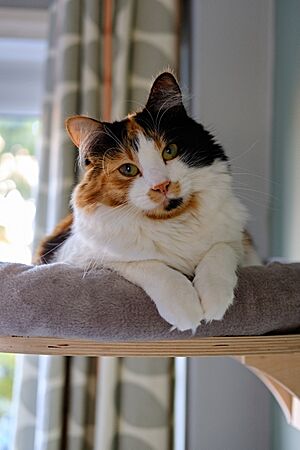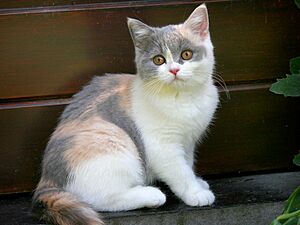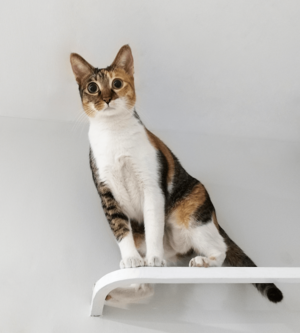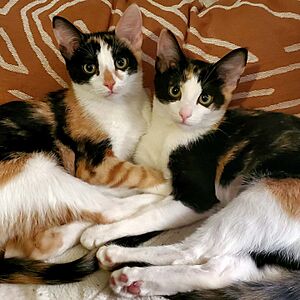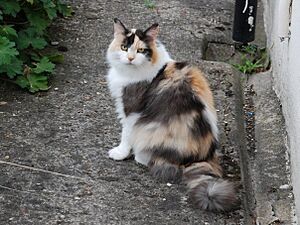Calico cat facts for kids
A calico cat is a type of domestic cat with a special three-color coat. These cats usually have large patches of white, orange, and black fur. Sometimes, their colors might be lighter, like cream, blue-grey, and gold.
It's important to know that "calico" describes the cat's fur colors, not a specific breed of cat. Many different cat breeds can have calico coloring, like the Manx cat, American Shorthair, Maine Coon, and Persian cat.
Calico cats are often confused with tortoiseshell cats. Tortoiseshells also have black and orange fur, but they usually have very little or no white. Their colors are often mixed or "mottled" rather than appearing in large patches. Outside of North America, calico cats are sometimes called "tortoiseshell and white" cats.
Contents
Why are Calico Cats Mostly Female?
Calico cats are almost always female. This is because the genes that control orange and black fur colors are found on the X chromosome.
- Female cats have two X chromosomes (XX).
- Male cats have one X and one Y chromosome (XY).
Since females have two X chromosomes, they can carry the gene for orange fur on one X and the gene for black fur on the other X. During a female kitten's development, one of the X chromosomes in each cell randomly "turns off." This is why calico cats have patches of different colors – some patches show the orange color from one X chromosome, and other patches show the black color from the other X chromosome. The white patches come from a different gene that stops color from appearing.
It's very rare to find a male calico cat. When it happens, it's usually because the male cat has an extra X chromosome (XXY), a condition called Klinefelter syndrome. These male calico cats are almost always unable to have kittens (sterile).
The Story Behind the Name
The word "calico" comes from a type of colorful fabric. This fabric was first made in a city called Calicut in India. When the fabric came to the United States, people started using the word "calico" to describe its bright, patterned design.
Later, people began using "calico" to describe cats with similar colorful, patched fur. So, when you hear "calico cat," it's like saying "a cat with a colorful, patterned coat."
Calico Cats in History and Culture
Calico cats don't belong to a specific breed, so they don't have a single historical origin. However, their unique coloring has made them special in different places.
Maryland's State Cat
The calico cat has been the official state cat of Maryland since October 1, 2001. They were chosen because their white, black, and orange colors match the colors of Maryland's state bird, the Baltimore oriole, and the state insect, the Baltimore checkerspot butterfly.
Lucky Cats Around the World
Many cultures believe that calico cats bring good luck.
- In Germany, they are called "Glückskatze," which means "lucky cat."
- In the United States, some people call them "money cats."
- In Japan, the famous waving cat statues, called Maneki-neko, often show calico cats. These statues are believed to bring good luck and fortune.
- Japanese sailors used to keep calico cats on their ships. They believed the cats would protect them from bad luck at sea.
Calico Cats in Books
In the late 1800s, a writer named Eugene Field wrote a famous children's poem called "The Duel." It's also known as "The Gingham Dog and the Calico Cat."
See also
 In Spanish: Gato calicó para niños
In Spanish: Gato calicó para niños
- Bicolor cat
- Cat coat genetics
- Tabby cat
- Tortoiseshell cat
 | Aaron Henry |
 | T. R. M. Howard |
 | Jesse Jackson |


